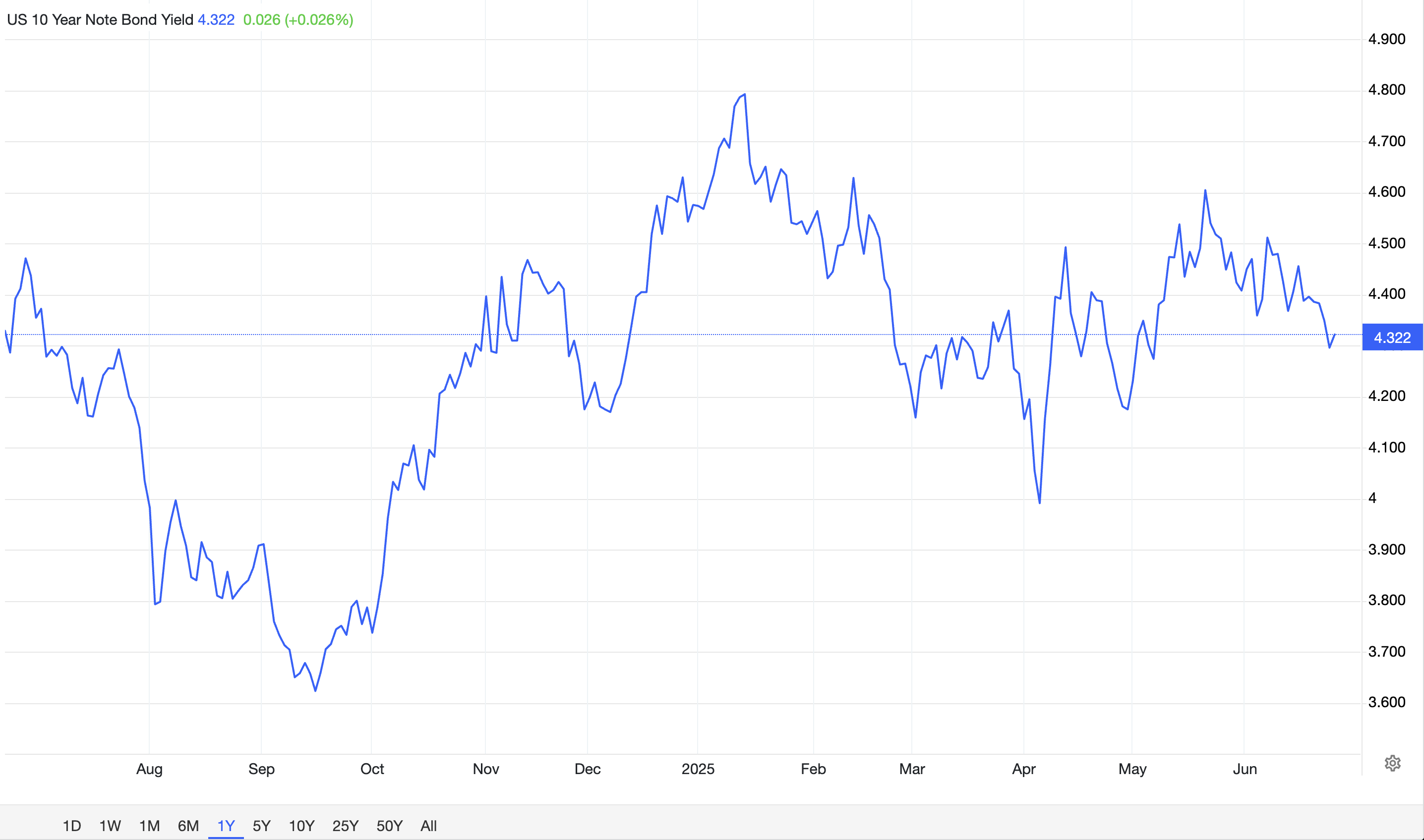Even during peacetime, the United States is facing significant financial challenges similar to a crisis. National debt is increasing, and the bond market is showing vulnerability. The political environment, where reaching a consensus on financial solutions is difficult, further complicates these issues.
In a conversation with BeInCrypto, Matthew Pines, Director of the Bitcoin Policy Institute, argued that Bitcoin-enhanced Treasury bonds, or BitBonds, could provide an alternative solution to lower interest rates and alleviate fiscal burdens without additional costs to U.S. taxpayers.
Increasing U.S. Debt Crisis
The United States is facing substantial financial pressure, with national debt reaching approximately $36.2 trillion.
Exacerbating this already concerning figure are historically high government bond interest rates. The 10-year Treasury bond yield has been fluctuating around 4.3% recently, with 30-year bond yields showing even higher levels.

These rates pose specific challenges as the government prepares to refinance a significant portion of debt issued at much lower interest rates during the COVID-19 pandemic.
If new debt is issued at current interest rates, it would lock in a substantially heavy interest burden for future U.S. taxpayers, worsening the nation's financial strain.
Despite the economy showing warning signs, discussions to mitigate the issue before it gets out of hand have been notably limited. Alternative solutions are circulating within the cryptocurrency community.
Chronic Fiscal Imbalance
The U.S. fiscal deficit problem is not new. For decades, the country has continuously spent more than its income, accumulating national debt.
Nevertheless, most governments that have exchanged power have done almost nothing to change this long-standing reality.
"We are in quite a good economic situation right now. We have low unemployment and moderate inflation, but the government's fiscal condition looks like we're fighting a war. It's almost returning to COVID levels. This signals a fundamental pathological condition in the federal financial structure." – Matthew Pines, Director of Bitcoin Policy Institute
The basic economic approach to addressing the U.S.'s massive fiscal deficit would suggest stricter spending and increased production. However, significant political obstacles exist in implementing such measures.
"In a perfect world, the government could maintain a balanced budget and politically navigate the difficult choices related to reducing government programs. But even in relatively high-intensity periods, the government does not collect more than 20% of GDP in tax revenue. There are natural limits to what they can do." – Matthew Pines, Director of Bitcoin Policy Institute
This financial pressure is not merely an internal economic issue but reflects broader global changes that are intensifying already apparent power struggles.
Geopolitical Pressure and 'Unconventional' Solutions
China has long been a primary competitor of the United States. However, their competition has now become more intense than ever, especially in key areas like economic growth, AI dominance, and manufacturing intensity.
According to Pines, China has many means to potentially hinder U.S. progress.
"We are in a geopolitical environment, and our adversary China has significant influence, especially in our supply chains. Rare earth elements... and now they've moved up the value chain in terms of manufacturing competitiveness," he said, adding, "They can manipulate our inflation through supply chain issues."
This combination of pressures could drive the United States to seek solutions beyond traditional economic policies.
"We think we are at a point where we need to consider unconventional methods to help us." – Matthew Pines, Director of Bitcoin Policy Institute
Considering the current administration's notable openness to digital assets, Bitcoin might provide a solution to U.S. challenges.
What are Bitcoin-Enhanced Treasury Bonds, BitBonds?
In March, Pines, along with his Bitcoin Policy Institute colleague Andrew Hohns, released a policy report on implementing Bitcoin-enhanced Treasury bonds, or BitBonds.
We're proud to announce our latest policy brief, "Bitcoin-Enhanced Treasury Bonds: An Idea Whose Time Has Come." Co-authored by Andrew Hohns & @matthew_pines, it explores the viability of a BitBonds strategy.
— Bitcoin Policy Institute (@btcpolicyorg) March 31, 2025
Read here: https://t.co/Z65iqHnZB9 pic.twitter.com/XzIZC2n87B
This initiative is based on the fundamental concept of a Strategic Bitcoin Reserve (SBR), which recently gained attention through an administrative order establishing reserves for Bitcoin and other digital assets.
"The Trump administration has essentially promised not to sell the Bitcoin they already hold. And instructed the Treasury and Commerce Secretaries to find a way to budget-neutrally secure additional Bitcoin in the SBR without tax burden." – Pines
BitBonds could be one way to achieve the latter.
BitBond Methodology
BitBond is basically similar to a typical government bond. However, instead of allocating 100% of bond returns to traditional government fund management, some are allocated to Bitcoin purchases. Ultimately, how much will be allocated depends on the federal government's decision.
Pines and Horns proposed 10% for simplification, but Pines explained that the start could be as small as 1%.
"The government sells 10-year bonds worth $1 billion, and instead of using 10% of the proceeds for government operating funds, they keep half in the government's SBR indefinitely," Pines explained and added. "The remaining $50 million will be kept in an escrow account and used to pay a certain amount of Bitcoin to bond buyers during the bond's lifetime. Essentially, it's purchasing a fixed amount of Bitcoin with guaranteed distribution during the bond's lifetime."
These indicators are also subject to discussion. The federal government could use all 10% for Bitcoin purchases or allocate all of it to bondholders.
Anyway, the central idea of these bonds is to integrate Bitcoin's high volatility and high return aspects into the U.S. Treasury's return profile.
The ultimate goal is to lower interest rates and begin repaying debt through Bitcoin's price appreciation.
Double Benefit: Interest Rate Reduction and Bitcoin Utilization
(The rest of the translation follows the same pattern, maintaining the specified translations for specific terms)Pines also clearly stated that BitBond is intended to be used as a complementary tool, not to disrupt the existing financial system.
While the path to implementing BitBond may be slow due to bureaucratic procedures and the need for thorough research, this concept provides a unique opportunity to address urgent fiscal issues of the country.







